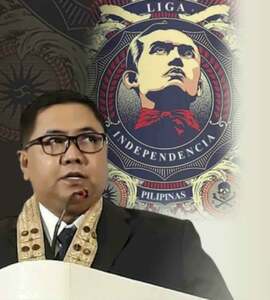
SA hangaring linawin at tugunan ang kakulangan sa ilang probisyon sa ilalim ng 1987 Constitution, iminungkahi ng isang mambabatas ng Kamara ang pagsusulong ng Constitutional Convention.
Sa isang kalatas, nanindigan si Deputy Speaker Ronaldo Puno na tumatayong chairman ng National Unity Party (NUP), na ang ConCon ang pinakamainam at nagtataglay ng “transparent at participatory mechanism” para linawin — kung hindi man ituwid ang mga butas sa konstitusyon
“Today, I submit to this August chamber that while the provisions of our Constitution are noble in aspiration, certain provisions are marked by ambiguity and procedural deficiency. These deficiencies do not merely complicate interpretation; they obstruct reform, hinder effective governance, and erode public trust,” wika ng Antipolo City 1st District representative.
Paglilinaw ni Puno, hindi layon ng panukala ibasura ang 1987 Constitution , bagkus ay panawagan sa itama at kumpletuhin ang pagkukulang sa saligang batas.
Paliwanag ng ranking House official, ang ConCon ay nagbibigay pagkakataon sa taumbayan pumili ng mga delegadong babalangkas ng amyenda sa partikular na probisyon.
“The ConCon route, rather than a constituent assembly, ensures singularity of purpose, freeing delegates from being preoccupied or derailed by lawmaking, oversight functions, and impeachment concerns,” ayon pa kay Puno.
“Conflict of interest would be avoided, broader representation guaranteed, and risk of political expediency is reduced,” dugtong pa niya.
Tinukoy naman ni Puno ang aniya’y ilang malabo at may butas na isinasaad ng 1987 Constitution na siyang nagpapahina sa legal foundations nito.
“The most recent example is the interpretation of the word “forthwith” in Article XI, Section 3(4) on impeachment, which should have been a procedural safeguard against delay, but has instead become a source of deadlock and controversy. This issue has raised serious constitutional and jurisprudential questions,” diin ng kongresista.
“Does the legislature now view the recent interpretation of ‘forthwith’ as applicable to ALL similar clauses in the Charter? Can the clear urgency mandated by constitutional language now be indefinitely stalled under the guise of interpretive discretion?” saad pa ni Puno sa kanyang privilege speech.
“This case alone shows how a single ambiguous word can become the justification for legislative inaction, procedural manipulation, or worse, the loss of accountability itself,” punto ng mambabatas.
Kabilang sa iba pang probisyon nakitaan ni Puno ng “constitutional ambiguity” ay ang sumusunod:
- Article VIII, Section 8 hinggil sa Judicial and Bar Council (JBC), kung saan sinabi na ang mga miyembro ng JBC ay dapat may representative ng Congress, subalit hindi malinaw kung ito’y mula sa Senado o sa Kamara.
“The Supreme Court had to rule on this ambiguity, stating that only one member of Congress can serve in the JBC at any given time. This has resulted in an awkward compromise of only one member of Congress, alternating between the Senate and the House of Representatives, sitting in the JBC,” sabi ni Puno hinggil dito.
- Article VI, Section 28, paragraph 4 na para naman sa pagbibigay ng tax exemptions, na isinasaad na “no law granting any tax exemption shall be passed without the concurrence of a majority of all the Members of the Congress..”
Ani Puno, hindi malinaw dito kung dapat bang joint body o magkahiwalay na bumuo ng panukalang ang dalawang legislative branches gayundi kung paano matukoy ang quorum at paraan ng pagboto ng mga mambabatas.
- Article VII, Section 19 na para sa presidential amnesty kung saan nakasaad na dapat katigan ang ibibigay na amnestiya ng “majority of the members of Congress.”
“The provision fails to specify whether this should occur through a joint vote or as separate votes by the Senate and the House. This lack of procedural clarity has led to intense debates when presidential amnesty was granted to members of the Magdalo Group, including former Sen. Antonio Trillanes IV,” sabi ni Puno.
- Article X, Section 8 na tungkol sa pagtatakda ng fixed three-year term para sa elective local officials, subalit hindi kasama ang barangay officials.
“The provision, which allowed Congress to pass at least five laws to postpone the holding of the barangay elections, has been abused either for political expediency or because of budgetary constraints, eroding “democratic accountability at the most local level of governance,” ang siya naman ipinupunto dito ng Deputy Speaker.
“A Constitution that allows repeated legislative interference in electoral timelines, without limit, is a Constitution vulnerable to manipulation,” giit pa ni Puno.
Ani Puno, dahil sa kulang o malabong probisyon, nagkakaroon ng butas sa Saligang Batas na humantong sa political crises at institutional paralysis. Nabalewala rin aniya ang rule of law, nawala ang tiwala ng mga mamamayan at nalayo sa institusyon na dapat ay naglilingkod sa mga tao.
“Mr. Speaker, I do not stand before this Chamber to prescribe solutions to these complex legal dilemmas. But I do contend, with deep conviction, that the Filipino people deserve a Constitution that speaks plainly and very clearly,” aniya pa.
“As the supreme law of the land, the Constitution must speak with clarity and force; its provisions must be comprehensible not only to courts and legislators but to the citizens whose rights it enshrines.” pagtatapos ng kongresista. (ROMEO ALLAN BUTUYAN II)



